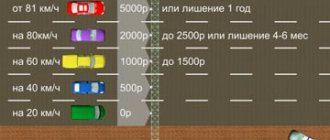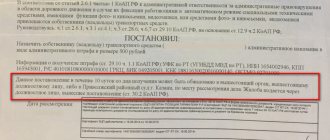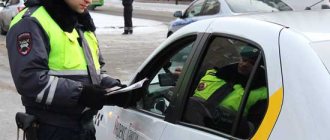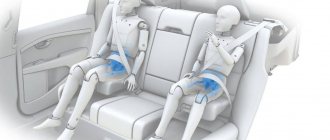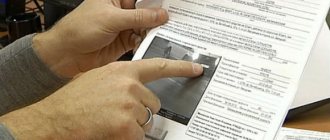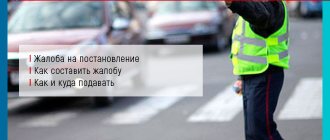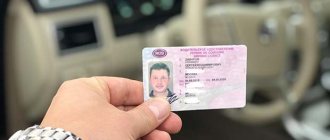Content
- What fines can be challenged?
- Who can challenge fines and how to find out if they exist
- How long does it take to challenge a traffic police fine?
- Where to send a complaint
- What complaints should be sent to the traffic police?
- What complaints should be sent to court?
- How to file a complaint to challenge a fine
- How to file a complaint to appeal a traffic police fine
- How to challenge fines online
- How long does it take to process complaints?
- What are the chances of successfully challenging a fine?
- What to do if the complaint is not satisfied
- How to get money back for an erroneous fine
If a driver receives a fine for a violation that he did not commit, he can appeal it. We tell you in what cases sanctions can be challenged, within what time frame and how to appeal a traffic police decision.
What is the difference between the traffic police, MADI and AMPP
Traffic police The State Road Safety Inspectorate deals with all violations related to transport in Russia.
MADI. The Moscow Administrative Road Inspectorate fines for violating parking rules and transporting passengers in taxis in Moscow. He also controls loading and unloading at night.
AMPP. The administrator of the Moscow parking space fines for unpaid parking in the capital.
To find out which organization the fine is from, look at the first digits in the resolution number.
- 188 - traffic police,
- 782 or 0356 - MADI,
- 780 or 355 - AMPP.
Fines from cameras are easy to find out: the resolution number begins with the numbers 188101
What fines can be challenged?
The driver has the right to appeal any traffic police fine with which he does not agree. But before challenging a fine, you need to make sure there are grounds and evidence of innocence. Arguments must be supported by documents, otherwise no one will believe them, no matter how convincing they sound.
The following circumstances are grounds for appealing traffic sanctions:
- the camera incorrectly recognized the license plate number, and someone else’s car was included in the photo;
- it was not the owner who was driving, but an authorized person or a tenant;
- the owner of the car was in another place at the time of the violation;
- the driver sold the car and could not drive it at the time of the violation;
- the technical characteristics of the car do not allow it to exceed the speed limits specified in the resolution;
- a fine was received twice for the same violation;
- there were no signs at the site of the violation, the markings were erased, or the condition of the road surface was poor.
There may be other factors that allow the driver to challenge the sanctions imposed on him. For example, it was not a car that crossed the road, but its shadow, but the camera still issued a fine.
Evidence for appealing a fine may include:
- documentation for the car, if the technical characteristics or license plate of the car are confirmed;
- insurance for two or more persons, a power of attorney for a car or a rental agreement, if you need to prove that another person was driving;
- a certificate from a hospital, a tourist voucher, transport tickets, if it is confirmed that the driver was not driving at the time of the violation;
- agreement with the buyer if the car no longer belongs to the owner.
It is permitted to use any documents, photos or videos, or witness statements that will help establish the driver’s non-involvement in the violation committed.
Also read: How to find out what the fine was for
Result of appeal
After submitting an application to the court or the traffic police, it is sent to the office for processing. Responsible employees analyze the validity of the information specified in the complaint, check it for compliance with the legislative framework, and take explanatory notes from officials involved in the conflict. If necessary, requests are made to the appropriate authorities to confirm the information contained in the document.
The period for consideration of a written complaint is 30 days (Article 341 of Order of the Ministry of Internal Affairs of Russia No. 664 of August 23, 2017). In some cases, it is possible to extend the period for consideration of the application, of which the citizen must be notified. The applicant is also notified of the place and time of the court hearing.
The result of appealing a traffic police fine may be the following decisions.
- Amendments to the resolution.
- Termination of proceedings in relation to an administrative offense.
- Leave the resolution in force.
If the authorities recognize the applicant’s arguments as justified, he will be relieved of responsibility and will not have to pay a fine to the traffic police. Usually the court is on the side of the car owner in the following cases:
- If the violation was the only way to avoid an accident.
- In the case where the applicant managed to provide undeniable evidence of his innocence.
- For a minor offense that does not entail punishment or liability.
- If two fines are issued for the same action.
The result of appealing the decision depends, first of all, on the validity of the applicant’s arguments.
Who can challenge fines and how to find out if they exist
The right to appeal a traffic police fine belongs to the person in whose name the decision was issued, or his representative who has a power of attorney certified by a notary.
Fines from automatic traffic cameras are sent to the owners of the cars, and it is the owners who must appeal.
It happens that letters do not reach the recipient on time or are completely lost, and the car owner does not know about their presence. You can check your car for fines through the avtocod.ru service. The report is generated within 5 minutes and shows what problems, in addition to fines, the car has at the time of inspection.
In the block with fines you will see how many of them were issued, by whom, for what amount, for what items, what is the total debt.
If the violation is caught on camera, the report will display a photo that clearly shows the license plate number of the car. If the number belongs to another car, there is every reason to challenge the fine. A screenshot of this part of the avtocod.ru report can be attached to the complaint as evidence of innocence.
If the fines are old and the FSSP has imposed bans on the car due to non-payment, information about the restrictions will also be displayed in the report.
You can check your car for fines through the avtocod.ru service using the VIN or license plate number.
Also read: Payment of traffic fines with a 50% discount
Legislation
The rules and procedure for appealing a decision of a traffic police officer, the circle of persons who have the right to complain, and the time frame for the document to enter into legal force are fully listed in Chapters 25, 30, 31 of the Code of Administrative Offenses of the Russian Federation.
- Articles 25.1–25.5 determine the circle of persons who are allowed to challenge the decisions of a traffic police officer.
- Art. 30.1 guarantees a citizen the right to complain about an illegally issued decision.
- Art. 30.3 stipulates the time limits given to the person against whom the decision was made to file a complaint.
- In Art. 31.1 establishes the terms for the act to come into force.
How long does it take to challenge a traffic police fine?
The law allows 10 days to appeal a traffic police decision from the moment the decision was issued.
A copy of the resolution may be provided to the person guilty of the violation in the following ways:
- in person if a violation is recorded on the road by a traffic inspector;
- by a review team, if the driver disagreed with the inspector’s opinion, but a group of traffic police officers reviewed the incident and confirmed the driver’s guilt;
- by the court when the case was considered by this authority;
- by post – by letter, if the violation was recorded by a traffic camera (the appeal period will begin to count the next day from the moment the driver signs for receipt of the registered letter).
The deadline for appealing a traffic police decision missed for valid reasons is subject to restoration. To do this, the driver must write a petition in any form and send it to the traffic police at the place where the violation was committed. The application must indicate a valid reason why the deadline was missed and ask for it to be reinstated. Below you can find a request form for reinstatement of the deadline.
Along with the application, documents proving the fact that the deadline was missed for valid reasons are submitted. For example, if the driver was undergoing treatment, an extract from the hospital is attached, and if he was absent from the city, transport tickets, a voucher, etc.
Also read: Traffic police fines with photo recording: how not to miss them and where to check
Reasons for filing an appeal against the traffic police decision?
The need to appeal a traffic police decision may be due to the following reasons:
- technical error of the camera during video shooting;
- the desire to fundamentally defend one’s own innocence before representatives of the traffic police;
- another person was driving a car at the time the offense was recorded - the car was being driven by a relative or acquaintance;
- sale of a car and untimely re-registration to the new owner, so messages about penalties are sent to the old address;
- the presence of mitigating circumstances that reduce the amount of the fine imposed, and others.
Attention
It is permissible to file a petition not only for incorrect actions of a representative of an authority, but also for inaction that caused unfair punishment.
To protect yourself, in the event of an inspection by a traffic police representative, when drawing up a resolution and protocol, you must adhere to the following recommendations:
- check the contents of the documents in detail for errors;
- if inconsistencies are identified and the government representative refuses to take them into account in the document, reflect personal opinion when signing the paper;
- it should be persuaded to include in the document the presence of an eyewitness testifying in favor of the accused of an offense;
- will help prove the correctness of video and photo materials taken at the scene of the incident or filmed by the registrar;
- if there are empty lines in the readings, they should be crossed out to eliminate the possibility of unwanted filling;
- You should receive a copy of the document, which will help you take care of your own protection in a timely manner.
IMPORTANT
It is necessary to understand the difference between the resolution and the traffic police protocol. The first document records the fact of the violation, confirms the guilt of the violator and establishes the amount of the fine. In the second (when drawing up a protocol), the circumstances of the incident are set out without drawing conclusions about its causes and those responsible.
What complaints should be sent to the traffic police?
You can appeal any fine to the traffic police, including those from a traffic camera, when:
- The resolution was drawn up with technical errors, for example, the license plate number of the car was read incorrectly or the owner of the car was incorrectly identified.
- There was a camera reaction to extraneous factors, for example, it was not the car that crossed the solid line, but its shadow, but the camera recorded the violation. Or if a passing motorcycle exceeded the speed, and the camera imposed a fine on the driver of the car.
- If you ran a red light following a signal from a traffic controller, and the camera issued a fine.
- In any other cases when the fine was issued unlawfully and there is evidence of the driver’s innocence.
Some motorists send complaints directly to the court, but we do not recommend skipping through a lower authority. The traffic police can solve the problem faster and without involving the judiciary. And in court they will ask why you didn’t try to resolve the situation with the traffic police.
Also read: I purchased a car at a location other than my place of registration: is it possible to register it there?
What is a traffic police resolution?
A traffic police resolution is an executive document drawn up by a representative of the specified structure or a judge during the consideration of a case, outlining the circumstances of the offense and listing the victims, perpetrators and the type of punishment applicable to them.
Attention! If you have any questions, you can chat for free with a lawyer at the bottom of the screen or call Moscow; Saint Petersburg; Free call for all of Russia.
The traffic police resolution is drawn up immediately after the fact of the violation or based on the results of its subsequent consideration in court, within the time limits established by law. An example of a resolution form:
How to file a complaint to challenge a fine
Before you challenge a traffic police fine, you need to competently draw up a complaint. Any written or printed form is acceptable for it, but with the obligatory indication of the following points.
The official of the traffic police or the court (name, address) where the complaint is filed, as well as the personal and contact information of the driver.
The title “Complaint against a resolution on an administrative violation”, the number of the resolution and the date of its issuance.
A descriptive part with the number, date of the decision and the article of the Code of Administrative Offenses under which the driver is accused.
Descriptions of the circumstances under which the driver considers the fine imposed to be unlawful.
Requests to cancel the imposed monetary penalty and terminate the proceedings with reference to the legislation.
List of evidence - documentation, photos and videos confirming the driver’s arguments and attached to the complaint.
Driver's signature and date of document preparation.
If the violation was committed in another city and the driver does not have the opportunity to travel there, the complaint indicates a request to consider the case without his participation. Below you can find the document form.
You can also familiarize yourself with other samples of complaints against decisions on administrative offenses.
Driver's complaint about the cancellation of a fine that came to the wrong car
Complaint against a parking fine
Also read: Electronic PTS: what is it, how to get it and how to register a car with the traffic police
Nuances
When submitting an application to the court, a citizen is recommended to personally participate in the hearings in order to have a better chance of proving his case. The most common arguments in favor of the illegality of the fine issued by the traffic police are the following:
- The vehicle was not located at the scene of the offense, but somewhere else. Initially, when using CCTV cameras, many errors occurred, and fines were received not by real violators, but by completely different people. Nowadays this happens much less frequently, but it still happens due to the inattention of inspectors or poor visibility of the numbers. In such a situation, it is necessary to document that the car was located in another place: in a parking lot, in a workshop, etc.
- If another driver was driving and it can be proven, then he will have to pay the fine. But it is important that it is included in the MTPL policy, otherwise a new offense may arise.
- Sometimes the technical characteristics of a vehicle are irrefutable evidence that there was no violation, for example, with a fine for speeding.
- The basis for canceling the decision may be the absence of a sign indicating that video or photography was taking place.
If the driver does not agree with the protocol drawn up by the inspector, then at the time of its preparation it is necessary to immediately indicate this and sign. This will help subsequently prove to the court that initially the car owner considered the fine issued for the violation to be unlawful.
An application to the court or the traffic police may be rejected for several reasons.
- The complaint does not indicate the name and contact information of the sender.
- The statement is written illegibly and cannot be read.
- The outcome of the complaint may require the disclosure of state secrets.
Experts recommend filing a complaint about the unlawfulness of the fine with the judicial authorities. If the essence of the claims is clearly stated and supporting documents are available, the applicant has a great chance of winning the case. In megacities (Moscow, St. Petersburg, etc.), in addition to the standard methods of filing a complaint, there are others. Applicants can contact the hotline of the Moscow Parking Service or MADI.
How to file a complaint to appeal a traffic police fine
Currently, there are two ways to send a complaint to challenge a fine: send it by registered mail or bring it in person to the traffic police or the district court at the place where the decision was issued.
When applying in person, the complaint is submitted to the secretary in two copies. One will remain with the traffic police for subsequent consideration, and on the second the secretary will put a date and sign for receipt, and then return it to the driver. The car owner must keep this copy to confirm the filing of the complaint.
When sending by mail, you should save postal receipts.
Also read: How to appeal a traffic police fine from a surveillance camera: precise instructions
Appealing a traffic police decision for parking
You should try to appeal a traffic police fine for a parking violation through online resources at the addresses given above. If the problem is not solved in this way, the petition can be delivered to the court at the place of incident in person or sent by mail. Those interested can familiarize themselves with a sample application form.
How to challenge fines online
Not every traffic fine can be appealed online. Drivers will have this opportunity only from September 1, 2021. Sanctions from photographic cameras can be challenged at State Services by receiving a free electronic signature.
Today, you can only file a complaint online against sanctions from MADI and AMPP. Only Moscow residents have this opportunity. You can challenge fines from MADI and AMPP through the following websites:
- mos.ru;
- avtokod.mos.ru;
- transport.mos.ru (legal entities send a complaint by e-mail on the organization’s letterhead with the signature of the manager).
Mos.ru accepts complaints regarding fines:
- for incorrect and unpaid parking;
- for a forced stop or parking in the wrong place, for example, if the driver became ill or the car broke down;
- for an erroneous decision (there was no violation or the license plate of another car is indicated in the document).
To challenge a fine, the driver fills out a complaint form, prints it out, signs it, takes a scan of the document and attaches it to the electronic application on the website. In addition, you need to attach documents for the car and a resolution on the sanctions imposed. The response to the application will be sent to your personal account on the website.
Avtocod.mos.ru accepts complaints for illegal parking, and also allows you to return funds erroneously paid for fines.
You can also appeal a decision on violation of traffic rules through State Services, but the list of cities and regions is limited. Residents of Tula, Moscow, Udmurtia, Tatarstan, Kaluga, Tver, Belgorod, Ryazan and Tyumen regions, Perm and Krasnodar regions can challenge the fine.
Drivers from other cities and regions can appeal the fine by directly contacting the traffic police. Not all traffic police have their own Internet resources that accept complaints online.
Some drivers write complaints on the official website of the traffic police. According to Article 30 of the Administrative Code, such appeals do not have legal force, since the driver does not have the opportunity to verify his identity with an electronic signature.
Also read: How not to “insist” on half a million and where to check your car for fines
How to get money back for a canceled, erroneously or repaid fine
If you need to return money based on the cancellation of the decision, first appeal the fine. To do this, send an application addressed to the head of the department of the service that issued the fine. As a result, you will receive a document - a decision to cancel the decision.
Find information about the recipient. To understand which agency to send the request to, pay attention to the first digits in the resolution number. 188 - traffic police, 782 or 0356 - MADI, 780 or 355 - AMPP.
Collect documents. To get your money back, you will need these documents:
- copy of the passport. Do not forget the original when contacting in person;
- your account information so that the organization can return the money;
- a payment receipt that confirms payment;
- if the decision was canceled - a copy of the decision to cancel the decision;
- if the fine is paid again - a copy of the resolution.
Fill out an application. Write to the head of the department whose employee made the decision. Use sample applications for the State Traffic Safety Inspectorate, MADI or AMPP.
Apply. You will have to visit the traffic police and AMPP in person; you can submit an application to MADI online.
Read more about how to get your money back for a fine paid twice in our other article.
What are the chances of successfully challenging a fine?
The chances of a positive outcome, if there is strong evidence, are high. Here are a few examples where car owners were able to successfully challenge fines.
In the Nizhny Novgorod region in 2021, a woman appealed a fine from a camera for speeding. The car was sold at the time of the violation. The driver presented the court with a purchase and sale agreement, confirming that the car was in the use of another person. The court upheld the driver's complaint and canceled the imposed sanctions.
The second case occurred in Moscow in 2021. The driver was fined under Part 1 of Article 12.1 of the Code of Administrative Offenses for driving an unregistered car in the amount of 500 rubles. The district court dismissed the complaint, after which the motorist appealed to the city court. Since the district court considered the case in violation of procedural rules and did not take into account the driver’s arguments, the city court rejected the decision and upheld the complaint.
Another case of appealing a fine for speeding was considered in May 2021 in the Kemerovo region. In this case, the car was in the use of another person under a rental agreement. The driver was able to prove his innocence, and the court sided with him.
Also read: When and how you can return a car to its former owner
Examples and grounds for appealing fines
So, let's look at the legal grounds for canceling a traffic police fine. They do not depend on a specific violation of traffic rules and lie in the illegality of bringing to responsibility on the general grounds of the Code of Administrative Violations. But some such grounds are often successful when appealing a fine for a certain violation, and in other cases, on the contrary, they are unlikely to cancel the decision.
Presumption of innocence
Reason : Article 1.5 of the Administrative Code. A person cannot be held accountable until his guilt is proven in accordance with the law.
Explanation
This norm is opposed by the common formulation of judges: “there is no reason not to trust a police officer, since he took the oath.” Despite the fact that the Supreme Court clarified that such grounds for refusing a complaint are prohibited, the courts are in no hurry to follow the instructions of the RF Supreme Court.
Common uses and chances of successful appeal
- For failure to allow a pedestrian to pass (12.18 Code of Administrative Offenses) - the chances of cancellation are low, even if you fulfilled the obligation to give way to a pedestrian (by law, he had to change the direction or speed of movement for this).
- For a belt or a phone - the likelihood of the complaint being satisfied is low, but if you have a DVR recording, then it is 100 percent.
- For parking - if you claim that another person parked and violated traffic rules, the chances are zero if it was recorded by a security camera, and you do not bring to court a person who admits to this.
- For intoxication - the chances are high if serious procedural violations are committed, since the 2021 legislation when charged with drunk driving provides for a rather lengthy step-by-step process of identifying the state of intoxication. As an example of procedural violations: lack of video recording or witnesses, formal refusal of a medical examination in the absence of evidence of this, and many others.
- For unreadable numbers - low. Despite the fact that evidence of a violation is that the number should not be read from 20 meters, courts rarely overturn decisions due to the absence of a video inspector measuring these 20 meters and the visibility of the license plate.
- For hidden numbers - average probability. Here the driver’s intent must be proven, but the chances of appealing are 50/50.
- For xenon, tinting or car malfunctions when the driver claims that it was not he who committed the violation, but the owner of the car or a former owner. The likelihood of a successful appeal is almost zero. Reason - the driver is obliged to check the absence of such conditions and malfunctions of control ability before setting off. In addition, tinting can be successfully appealed if there was no measurement, and the resolution indicates prosecution under Part 3.1 of Article 12.5 of the Code of Administrative Offenses (and not Part 1 of this article)
- Excessive speeding can be successfully contested if it was not recorded by a speed measuring device, or if the car license plates in the camera photo are not readable, differ from your car, or if the make and/or model of the car itself is not yours.
- For violation of signs (including overtaking, stopping and parking), if there were actually no signs or they were unreadable (in this case, it is better to photograph such a sign with reference to the specific location of the violation).
- For a red traffic light. The chances are again low if the inspector did not provide a video of the violation - judges often trust the words of the traffic police officer.
View the Supreme Court's practice on the presumption of innocence.
Limitation period for attraction
Reason : Article 4.5 of the Administrative Code.
Explanation
A person can be held accountable within 2 months from the date of traffic violation if the case is under the jurisdiction of the traffic police, and 3 months if it is under the jurisdiction of the court.
Common uses and chances of successful appeal
- For late registration (this is also called “expired DCT”) - if more than 2 months have passed since the date of the purchase and sale agreement, then they cannot legally charge you for this even when you come to register the car with the traffic police.
- For many traffic violations, for which deprivation of rights is provided (intoxication, refusal of examination, modified, hidden or missing license plate, leaving the scene of an accident and others), and the case is delayed for more than 3 months due to the wait for a court hearing.
View judicial practice on statutes of limitations.
The car was sold - a fine was received
Reason: note of Article 1.5 of the Code
Explanation
According to this note, car owners are responsible if they are recorded by cameras. The owner in our case is the buyer if he is caught on camera after the date and time in the sales contract. But the traffic police don’t know about this, unless he registered the car in his own name.
How to appeal a fine?
In this case, you should send a complaint using the example above and attach a copy of the purchase and sale agreement to it. The chances of a decision being overturned are almost always 100%.
There is a violation, but there is no guilt
Reason : Article 1.5 of the Administrative Code
Explanation
In administrative law there are differences between a violation and an offense - the latter contains a composition that includes the driver’s fault. If guilt is not proven, then prosecution is illegal - this is part of the presumption of innocence prescribed by Part 1 of Article 1.5 of the Code of Administrative Offenses.
Thus, if it is not your fault for violating traffic rules, then the fine is illegal.
Common uses and chances of successful appeal
- For fleeing the scene of an accident, if you simply did not notice the damage, then the probability of success in appealing is 50/50. It all depends on whether you can convince the judge of this, and in this situation we advise you to seek the help of a lawyer (as in all cases related to deprivation of rights).
- For late registration of a car with the traffic police, if registration bans are imposed on the car. Here, too, the chances depend on the specific judge, but if the ban appeared after purchasing the car due to a mistake by the bailiffs, then the chance of appealing such a fine tends to 100 percent.
View judicial practice in cases in which there is no evidence of guilt.
Insignificance
Reason : Article 2.9 of the Administrative Code
Explanation
This provision implies exemption from a fine for the violator if the violation did not entail a danger to public relations by the committed act.
Here one should also take into account the provisions of Articles 4.2 and 4.3 of the Code, which contain mitigating and aggravating circumstances, respectively.
Common uses and chances of successful appeal
But let us point out right away that insignificance as a basis for a successful appeal of a fine is rare and is possible only with fines with a minimum penalty of 500 rubles. But what exactly must be in order for a violation to be considered insignificant is the absence of traffic police fines for at least the last year, the absence of an accident and, moreover, the absence of injured and dead people in it.
View judicial practice on minor violations.
If you correct the violation on the spot
Reason : your duty not to violate as such, prescribed by all points of the traffic rules
Explanation
This is a practically non-working way to appeal a traffic police decision, because you are punished precisely for the violation recorded (visually or by special means). That is, if you eliminated the violation after the inspector stopped you, then you simply had to do it, but the fine issued in this case is legal, since before the stop you were driving in violation.
Common Applications
- tinting, including removable,
- dirty or stained license plates (but the presumption of innocence may apply here if the violation occurred while you were driving),
- driving without documents for a car or a driver’s license, if they were brought to you,
- driving without daytime running lights during the day or corresponding external lighting devices at night.
Read the practice of courts on eliminated violations on the spot.
The inspector issued a fine, but did not provide the video
Reason : Article 1.5 of the Code of Administrative Offenses as a variation of the presumption of innocence.
Explanation
Please note that this only applies if the traffic police officer really does not have video, but for all violations that do not require video recording directly by law, the chances of successfully appealing the fine are 50/50 due to the same lack of reason not to trust the officer police.
Common fines
- appealing a fine for not allowing a pedestrian to pass,
- for a belt or talking on the phone while driving,
- for parking,
- for dirty license plates,
- for a prohibitory traffic light signal.
View the practice of the Supreme Court on evidence from the words of the inspector.
Double punishment
Reason : part 5 of article 4.1 of the Code of Administrative Offenses
Explanation
This provision of the Code states that no one can be held liable twice for one violation. If, for example, you were recorded by 2 different cameras for one speeding violation, then there is only one violation, and the second fine must be appealed.
It’s another matter if you create a new offense with a new beginning of the movement. For example, if an inspector stopped you for dirty license plates, fined you, but you did not wipe them down and drove off again, then even the same traffic police inspector can stop you literally a couple of meters later and issue a fine again, because the composition of the APN in this case is management with unreadable numbers. It's the same as driving and speeding again.
In addition, there is an important subtlety with Autodories measuring average speed. If you drove under two or more pairs of such cameras, exceeding the speed only once, then according to the law you should be charged only once, and subsequent fines must be contested. But in practice, the courts refuse such complaints.
What to do if the complaint is not satisfied
If you receive a refusal to satisfy your complaint from the traffic police, you should contact the district court. In order not to be refused again, but this time from the court, we recommend that you support the complaint with more convincing evidence of innocence. If the district court refuses, contact a higher authority. The final authority is the Supreme Court of the Russian Federation.
If you cannot prove your innocence, you will have to pay a fine. You have 70 days to do this, otherwise the amount will double.
If you have a debt of more than 10 thousand rubles, bailiffs can seize bank accounts, suspend your driver’s license and apply other sanctions.
If you pay off the fine within 20 days of receiving the decision, a 50% discount will apply.
Also read: How to register a motorcycle with the traffic police in 2021
